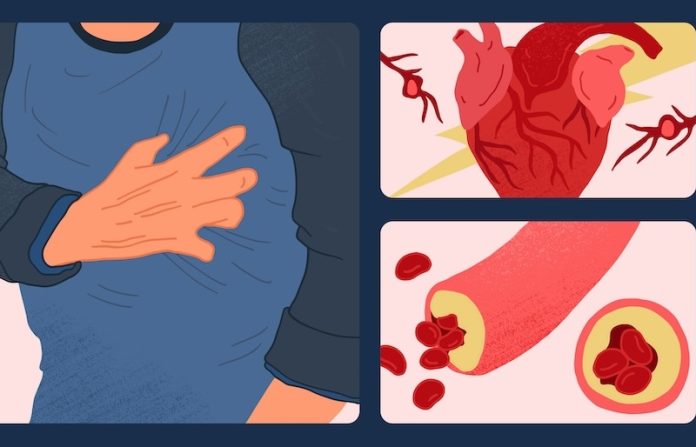
Arterial blockages in the heart, known as coronary artery disease (CAD), occur when the blood vessels supplying the heart with oxygen and nutrients become narrowed or blocked.
This condition is usually caused by the buildup of cholesterol-containing deposits (plaque) and inflammation in the arteries. Early recognition of the signs is critical, as CAD can lead to serious events like heart attacks.
CAD develops gradually over many years, often without noticeable symptoms in its early stages. As plaque accumulates and hardens—a process called atherosclerosis—it restricts blood flow to the heart.
When arteries become severely narrowed or completely blocked, symptoms can emerge, signaling an increased risk of a heart attack.
Here are the key signs of arterial blockages:
Chest Pain (Angina)
One of the most common symptoms of arterial blockages is chest pain or discomfort, referred to as angina. This pain often feels like pressure, squeezing, or fullness in the center of the chest.
It may also spread to the shoulders, arms, neck, jaw, or back. Angina is typically triggered by physical activity or emotional stress and subsides after a few minutes of rest.
Medical experts, including a study published in the Journal of the American College of Cardiology, stress that any new or worsening chest pain should be evaluated immediately by a healthcare provider.
Shortness of Breath
When the heart struggles to pump enough blood due to restricted arteries, shortness of breath can occur. This symptom might appear during exercise or even while resting. It is often accompanied by fatigue.
Research in the New England Journal of Medicine highlights that shortness of breath during physical activity may be one of the early signs of CAD.
Heart Palpitations
Irregular or fluttering heartbeats, known as palpitations, can also be a warning sign. These sensations occur because the heart is working harder to pump blood through clogged arteries, which can disrupt its normal rhythm.
Nausea, Indigestion, Heartburn, or Stomach Pain
These symptoms may occur during a heart attack and are more commonly reported by women. According to the Journal of Emergency Medicine, they can sometimes be mistaken for less serious conditions like acid reflux or the flu, delaying critical medical intervention.
Fatigue
Unexplained fatigue, especially if it appears suddenly or is related to activities that previously felt easy, can be another indicator of CAD. This symptom is more frequently reported by women and might occur weeks before a heart attack.
Sweating
Breaking out in a cold sweat without an obvious cause can also signal a heart attack. Sweating often accompanies other symptoms like chest pain or shortness of breath.
Why Early Recognition Matters
Identifying these symptoms and seeking medical help promptly is crucial. Diagnostic tools such as stress tests, echocardiograms, and coronary angiography can assess the extent of blockages and guide appropriate treatment.
Treatment and Prevention
Treatment for CAD depends on its severity and may include:
- Lifestyle changes: Adopting a heart-healthy diet, engaging in regular exercise, and quitting smoking.
- Medications: To manage cholesterol, blood pressure, and other risk factors.
- Procedures: Such as angioplasty to open blocked arteries or bypass surgery for severe cases.
Prevention plays a significant role in reducing the risk of CAD. Maintaining a balanced diet rich in fruits, vegetables, and whole grains, staying physically active, avoiding smoking, and managing stress are key steps.
Regular check-ups with a healthcare provider are also essential, particularly for those with risk factors like a family history of heart disease, high blood pressure, or diabetes.
In conclusion, understanding the warning signs of coronary artery disease and responding quickly can save lives. By adopting a proactive approach to heart health, individuals can significantly reduce their risk and improve their overall quality of life.
If you care about high blood pressure, please read studies about potatoes and high blood pressure, and top 10 choices for a blood pressure-friendly diet
For more information about high blood pressure, please see recent studies about impact of vitamins on high blood pressure you need to know, and the powerful link between high blood pressure and a potassium-rich diet.
Copyright © 2024 Knowridge Science Report. All rights reserved.



